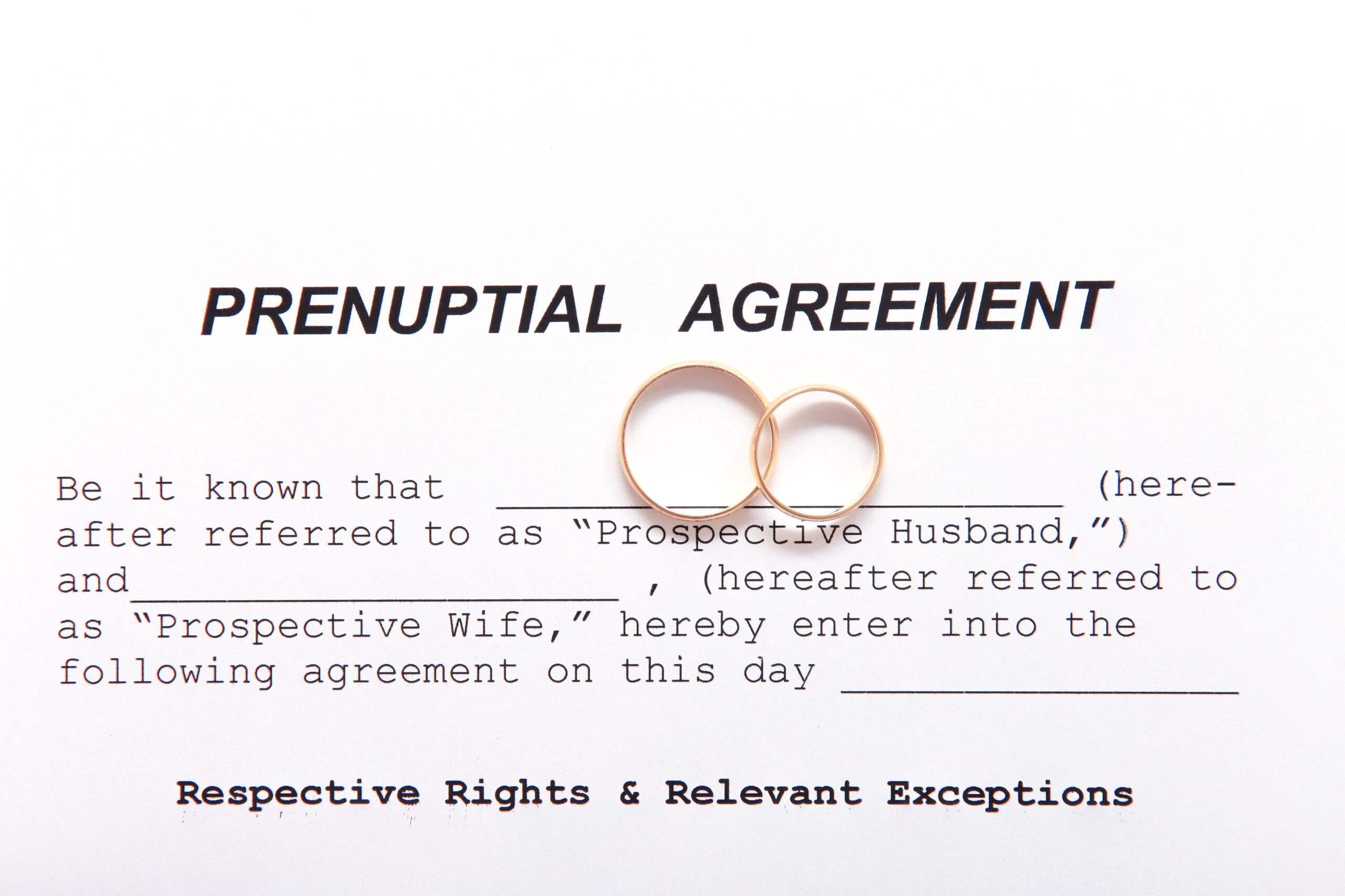Is A Prenuptial Agreement Right For You? Weighing The Pros And Cons
Explore the nuanced landscape of prenuptial agreement pros and cons in our insightful guide. Understand the financial benefits and potential challenges associated with prenups to make informed decisions for your journey into marriage.
Author:Paolo ReynaReviewer:James PierceJan 05, 20243.1K Shares76K Views

Amidst the wedding preparations and romantic dreams, many couples are now considering a legal aspect that may seem less enchanting but is undeniably important: the prenuptial agreement. Prenups, once associated with celebrity divorces and the ultra-wealthy, are becoming more common among couples from all walks of life.
In this article, we delve into prenuptial agreement pros and cons, aiming to shed light on this often misunderstood aspect of modern relationships. This legal contract can be a powerful tool for financial clarity and protection, but it also raises questions about trust, commitment, and the potential strain on the romantic foundation of marriage.
What Is A Prenuptial Agreement?
A prenuptial agreement, often referred to as a prenup, is a legal document designed to assist future spouses in safeguarding their individual assets, providing a clear framework for financial matters before marriage, and strategizing for the future. In the process of drafting a prenup, it is crucial for both parties to secure independent legal representation. This ensures that the prenuptial agreement is fair and equitable, preventing the imbalance of advantages in favor of one spouse.
Within the scope of a prenuptial agreement, various aspects can be covered, including:
- Assets brought into the marriage by each party -Clearly defining ownership of individual assets ensures transparency and helps prevent disputes over property division in the future.
- Accrued debts -Addressing any debts incurred before marriage is an essential component of a prenup, shielding each spouse from assuming the other's financial obligations.
- Separation of specific properties -Designating certain properties as separate ensures their exclusion from the communal pool of assets, maintaining their individual ownership.
- Family assets and properties -The inclusion of provisions regarding family assets and properties helps preserve generational wealth and ensures its proper allocation in case of divorce.
- Business interests -Safeguarding business assets and interests through a prenup can be vital, especially for entrepreneurs or individuals with substantial business holdings.
- Provisions for children from previous relationships -Addressing the financial needs of children from prior marriages or relationships is a compassionate and responsible consideration that can be incorporated into a prenuptial agreement.
Additionally, a prenup can extend beyond financial matters to include clauses regarding marital responsibilities, and financial expectations, and even initiate the estate planning process. Many couples use prenuptial agreements to outline how specific assets should be managed in the unfortunate event of one spouse's demise.
What Cannot Be Included In A Prenup?
While a prenuptial agreement can be a comprehensive tool for addressing various financial aspects and safeguarding individual interests, there are crucial limitations to its scope. Certain issues cannot be included in a prenup, and any attempt to make provisions for them will not be upheld by the courts.
The following critical matters cannot be included in a prenuptial agreement:
- Child Custody -The allocation of child custody cannot be determined in a prenup. Courts prioritize the best interests of the child, and decisions regarding custody are made during divorce proceedings based on factors such as the child's well-being, living arrangements, and the ability of each parent to provide a stable environment.
- Child Support -Similar to child custody, arrangements for child support cannot be predetermined in a prenuptial agreement. The financial support required for the upbringing of children is determined during divorce proceedings, taking into account factors like the financial capabilities of each parent and the specific needs of the child.
It's essential to recognize that family law courts aim to protect the rights and well-being of children and decisions related to child custody and support are made with their best interests in mind. As such, these matters must be handled separately during the divorce process, ensuring that the outcomes are fair and in accordance with the legal standards established to safeguard the rights of the children involved.
Pro - A Prenup Will Protect Your Wealth
A prenuptial agreementstands as a powerful instrument for safeguarding wealth, offering a dynamic approach that extends beyond the common misconception of protecting assets from each other. Rather, it serves as a collaborative tool allowing couples to jointly shield individual wealth brought into the marriage and potential financial gains accumulated throughout their union.
This dual-purpose wealth protection is achieved through the transparency mandated by a prenup. Both parties are compelled to openly communicate about their assets and debts, fostering a shared understanding of their financial landscape. The agreement prompts discussions on financial expectations, not only concerning existing assets but also those that may be acquired jointly in the future.
In managing wealth, a prenuptial agreement empowers couples to:
- Designate Separate and Shared Property -Clearly define what assets remain separate and which will be shared within the marriage.
- Outline Financial Responsibilities -Deliberate on how the couple's property and finances will be managed, establishing clear roles and responsibilities for each partner.
- Specify Rights Over Individual Assets -Identify each spouse's rights to control and manage individual assets or separate property, ensuring clarity and fairness.
- Address Debt Obligations -Develop a plan for addressing both existing and future debts brought into the marriage, preventing financial strains.
- Determine Alimony Conditions -Decide if, and under what conditions, one spouse may pay alimony to the other in the event of a divorce, providing financial security.
- Division of Property Holdings -Establish guidelines for dividing significant property holdings, such as real estate, in the event of a divorce.
- Handle Expected Inheritances -Clearly define how expected inheritances will be managed, avoiding potential conflicts.
Con - The Prenup Process Can Be Uncomfortable
Let's face it - delving into discussions about death, finances, and the potential for divorce is hardly the most comfortable of conversations, especially with your soon-to-be spouse. It's a topic that often lingers on the periphery, and many would rather avoid it altogether. Similar to the slightly bothersome tasks of cleaning baseboards or the oven, addressing these uncomfortable aspects feels necessary yet inherently uneasy.
However, much like the satisfaction that follows a thorough cleaning session, tackling these uncomfortable conversations about prenuptial agreements can bring a sense of clarity and reassurance. It's a task you might initially dread, but once accomplished, it offers a profound understanding of your partner and aligns both of you on critical aspects of life and the potential nuances of your prenuptial agreement.
In the end, while the prenuptial agreement process may be uncomfortable, it serves as a valuable opportunity for growth and mutual understanding. Just like the satisfaction that follows a thorough cleaning, addressing these uncomfortable topics paves the way for a clearer, more harmonious future together.
Pro - Prenups Can Protect The Person With Less Money, Too
In contrast to common misconceptions, prenuptial agreements extend their protective reach beyond the financially affluent partner; they can equally serve as a safeguard for individuals with fewer financial resources or even those with no financial assets whatsoever. Surprising as it may seem, a prenup can be advantageous even if one enters the marriage without any wealth.
How is this possible? A well-crafted prenuptial agreement can ensure that the spouse with fewer financial resources is adequately cared for by the other party through various provisions. These may include:
- Alimony (Spousal Support) -Prenups can establish terms for alimony, providing financial support to the less affluent spouse during and after the divorce. This can be especially crucial in situations where one partner has significantly higher earning potential.
- Lump Sum Payments (Equalization Payments) -The agreement may outline lump sum payments to balance financial disparities between spouses. This can help address any financial inequalities that may arise during the marriage or upon its dissolution.
- Asset Allocation -Prenuptial agreements can stipulate the fair distribution of assets, ensuring that the spouse with fewer financial resources is not left without means of financial support or faced with an unfair share of the economic burden post-divorce.
- Occupation of Primary Residence -For spouses who might not have a significant share in the marital property, prenups can specify the right to occupy the primary residence during and after divorce, offering a stable living situation amid the dissolution of the marriage.
- Life Insurance Death Benefits -In the unfortunate event of the death of one spouse, a prenuptial agreement can designate life insurance death benefits to the surviving spouse, providing an additional layer of financial security.
Con - Prenups Don't Always Hold Up In Court
While prenuptial agreements are commonly perceived as legal safeguards, it's essential to acknowledge that their enforceability is not guaranteed, and their strength may vary. Merely having a prenup in place does not automatically bind the courts to adhere to its terms. The effectiveness of a prenuptial agreement hinges on its fairness, clarity, and adherence to legal standards.
A robust and well-drafted prenuptial agreement is one that equally benefits both parties, avoiding substantial disadvantages to either spouse. Imbalances or clauses that disproportionately favor one party over the other may undermine the agreement's validity in the eyes of the court. Therefore, couples must work collaboratively and transparently when creating a prenup, ensuring that both individuals are content with the terms.
Moreover, if a prenuptial agreement includes clauses or provisions that violate legal principles or contravene established laws, it may face challenges in court. Courts prioritize legality and fairness, and any provisions that run afoul of these principles are likely to be scrutinized and potentially disregarded.
To bolster the chances of a prenup holding up in court, seeking the guidance of an experienced attorney during the drafting process is paramount. Legal professionals can navigate the complexities of family law, ensuring that the agreement adheres to legal standards and is more likely to withstand judicial scrutiny.
Relying on online templates or attempting to draft a prenup without the guidance of legal counsel increases the risk of oversights and potential legal pitfalls, compromising the agreement's effectiveness.
Pro - Makes Future Legal Processes Smoother
Beyond its role in simplifying the process of separation or divorce, a prenuptial agreement proves to be a versatile legal tool that extends its benefits well into the future. While it undeniably streamlines the divorce process, its impact is not confined to those circumstances; rather, it can significantly ease end-of-life planning and estate management.
A prenuptial agreement offers couples a proactive means of navigating decisions related to inheritance, particularly for the benefit of their children. Unlike a traditional will, a prenup allows couples to collaboratively make these decisions, providing a more flexible and tailored approach to distributing assets. This proactive planning empowers couples to shape their legacy and ensures that their wishes align with the unique dynamics of their family.
In some instances, a well-crafted prenuptial agreement can even offer a degree of flexibility that surpasses the constraints of state inheritance laws. By addressing these matters in advance, couples can chart a course that resonates with their values, preferences, and familial responsibilities, providing clarity and peace of mind.
Whether executed before or after marriage, a prenuptial agreement facilitates open communication and mutual decision-making. This collaborative approach not only applies to divorce-related matters but extends to broader legal issues that may arise in the future.
Con - Suggests A Distrust In The Relationship
The notion that prenuptial agreements suggest a fundamental distrust in the relationship is more of a prevailing myth than a genuine drawback.
Unfortunately, prenups have been unfairly stigmatized, with misconceptions portraying them as unromantic and indicative of a lack of faith in the durability of the relationship. Contrary to this perception, engaging in the process of preparing a prenuptial agreement does not necessarily imply distrust or a lack of confidence in the enduring strength of the relationship.
Rather than fostering mistrust, a well-executed prenuptial agreement can serve to enhance the bond between a couple. The process encourages open communication and collaboration, allowing partners to discuss and align on financial matters and future expectations. Far from being a source of division, a prenup can strengthen the foundation of a relationship by enabling both individuals to enter into marriage on a solid and equitable footing.
In reality, many couples find that a prenuptial agreement enhances their sense of security within the relationship. The agreement eliminates potential future conflicts over financial matters, providing a clear roadmap for how assets and responsibilities will be managed. Far from eroding trust, a prenup can instill confidence in both partners, fostering a sense of stability and reducing anxiety about potential disputes related to finances.
Pro - Define What Qualifies As Marital Property
The approach varies depending on whether the state follows community property principles or employs equitable distribution principles. In community property states, assets acquired during the marriage are generally considered equally owned by both spouses, and the court divides their value evenly.
On the other hand, equitable distribution states involve a judicial assessment to determine rightful ownership of marital property before an equitable division is executed.
Enter the prenuptial agreement - a valuable tool that can preemptively mitigate the potential for a contentious and prolonged property dispute. By clearly delineating what qualifies as marital property and specifying the desired distribution in case of a divorce, a prenup provides couples with a proactive means of avoiding acrimonious legal battles.
The flexibility afforded by a prenuptial agreement allows couples to tailor the division according to their preferences, whether it be a straightforward 50/50 split or a more nuanced unequal distribution.
What sets a prenup apart is the autonomy it grants to couples in shaping the narrative of their marital property and its future disposition. Rather than subjecting themselves to the uncertainties of the legal system, couples can proactively decide on the terms of their property division, and the court will duly honor and implement these preferences.
This aspect of a prenuptial agreement empowers couples to take control of their financial destiny and minimize the stress associated with marital property disputes, ultimately fostering a more amicable resolution during a challenging time.
Con - It Can Be Unbalanced
The assumption that divorce is an improbable outcome often leads individuals to hastily sign prenups without fully considering the potential consequences. The danger lies in unwittingly agreeing to terms that may disproportionately favor the spouse, leaving one party with less than their rightful share in the event of a divorce.
Acknowledging this imbalance underscores the importance of a measured and diligent approach when crafting a prenuptial agreement. To ensure fairness and equity, both parties must engage independent attorneys for the drafting and review processes. This dual representation acts as a safeguard, ensuring that each individual's interests are diligently protected and that the terms of the prenup reflect a balanced agreement.
The crux of avoiding an unbalanced prenuptial agreement lies in the mutual commitment to seek legal counsel. Independent attorneys bring objectivity to the negotiation table, helping to bridge potential disparities in bargaining power and ensuring that neither party is unduly disadvantaged.
Investing in this legal oversight is an investment in the long-term security of both individuals, fostering a sense of parity and mutual respect within the confines of the prenuptial agreement.
Pro - Save Time And Money
The dissolution of a marriage is a process known for its exorbitant costs and time-consuming nature. Even in cases where spouses initially find common ground on legal matters, the trajectory of divorce often leads to escalating court expenses and potential legal fees, resulting in financial strain. What may commence as a mutual understanding can progressively deviate into disagreements on significant issues, compounding both costs and time.
Enter the prenuptial agreement - a strategic investment that has the potential to save couples both time and money in the event of a divorce. A meticulously crafted prenup allows couples to proactively address and navigate the most common legal obstacles associated with divorce. By establishing clear guidelines and expectations in advance, a prenuptial agreement can pave the way for a swift resolution, circumventing the need for an extended and costly court battle.
The true value of a well-drafted prenup lies in its ability to preemptively mitigate the financial and temporal burdens associated with divorce proceedings. It empowers couples to sidestep the pitfalls of prolonged legal disputes and, instead, offers a streamlined path toward resolution. By investing time and consideration in a prenuptial agreement, couples can not only fortify their financial future but also preserve valuable time and resources, ensuring a more efficient and amicable transition if the unforeseen becomes a reality.
Con - It Might Be Unnecessary
The necessity of a prenuptial agreement may be called into question, particularly in states where divorce laws inherently align with your objectives for property division. In community property states, for instance, the court is mandated to equitably divide all marital property, presenting an automatic 50/50 split.
If such an even distribution is in line with your preferences, the added layer of a prenup may seem redundant. However, it is crucial to consult with an adept family law attorney to gain a comprehensive understanding of your state's specific regulations before entering into marriage.
Additionally, certain aspects remain beyond the purview of a prenuptial agreement, notably matters related to child custody, parenting time, and child support. If your primary concern revolves around these familial considerations rather than the division of property or debt, a prenup may prove unnecessary.
It's imperative to recognize that, irrespective of any contractual arrangements, courts retain the authority to adjudicate custody and child support matters, rendering prenuptial agreements inconsequential in these particular realms.
The decision to pursue a prenuptial agreement hinges on the individual circumstances and priorities of the couple. While certain states may provide a framework for equitable property division, understanding the nuances of family law remains paramount.
Consulting with a seasoned family law attorney ensures a nuanced comprehension of your state's legal landscape, guiding you toward an informed decision regarding the necessity of a prenuptial agreement based on your unique circumstances.
Frequently Asked Questions
Can A Prenup Protect My Business In A Divorce?
Yes, a well-crafted prenuptial agreement can include provisions to safeguard business interests, delineating their treatment in the event of a divorce.
Do Both Parties Need To Disclose All Assets For A Prenup To Be Valid?
Yes, full disclosure of assets and debts by both parties is crucial for the validity of a prenuptial agreement. Transparency ensures fairness and legality.
Can A Prenup Be Contested In Court?
Yes, a prenuptial agreement can be contested if it is deemed unfair, unconscionable, or if there is evidence of coercion, fraud, or lack of proper legal representation.
Does A Prenup Cover Future Debts Incurred During The Marriage?
Yes, a well-drafted prenup can address future debts, outlining how they will be handled and whether they will be considered joint or individual obligations.
Can A Prenup Include Provisions For Spousal Support Or Alimony?
A prenuptial agreement can specify the terms of spousal support, including the amount, duration, and conditions under which it would be applicable.
Final Thoughts
As couples stand at the threshold of matrimony, the decision to pursue a prenuptial agreement is a deeply personal one that requires thoughtful consideration. The advantages of financial clarity, asset protection, and streamlined legal processes can be compelling reasons to opt for a prenup. However, the emotional strain, perceived lack of commitment, and unforeseen challenges may give pause to others.
Ultimately, the key lies in open communication, mutual understanding, and, if pursued, the guidance of legal professionals to ensure that a prenuptial agreement is not just a legal document but a reflection of the trust and commitment shared between two individuals entering the sacred bond of marriage.
Jump to
What Is A Prenuptial Agreement?
What Cannot Be Included In A Prenup?
Pro - A Prenup Will Protect Your Wealth
Con - The Prenup Process Can Be Uncomfortable
Pro - Prenups Can Protect The Person With Less Money, Too
Con - Prenups Don't Always Hold Up In Court
Pro - Makes Future Legal Processes Smoother
Con - Suggests A Distrust In The Relationship
Pro - Define What Qualifies As Marital Property
Con - It Can Be Unbalanced
Pro - Save Time And Money
Con - It Might Be Unnecessary
Frequently Asked Questions
Final Thoughts

Paolo Reyna
Author

James Pierce
Reviewer
Latest Articles
Popular Articles




